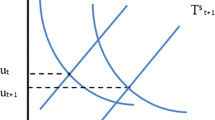Abstract
The purposes of this paper are to describe the behaviors of consumers and producers in the knowledge creation process and derive the optimal strategy for increasing the value of creativity in the market. This paper mathematically models the incentives that consumers have to contribute to knowledge creation. This analysis complements the previous studies and elucidates the system of knowledge creation through collaboration among consumers. Unlike in previous studies, the price setting strategy of producers is examined by relating it to knowledge creation activities of consumers. The analysis in this paper reveals that the value of a product to the consumer depends on the amount of knowledge creation by consumers, which is affected by the amount of public infrastructure, which, in turn, affects the price of the product. The price movement of IT products in the real world is consistent with the predicted movement of the equilibrium price in the market. Independently of the drastic increase in the value of IT products via the rapid increase in knowledge creation, the price of IT products has not been increasing. In this regard, the model presented in this paper captures part of the real-world movements.





Similar content being viewed by others
Notes
The website was accessed September 2012 at http://realbusiness.co.uk/advice_and_guides/3-ways-to-satisfy-the-cyber-customer.
References
Bereiter, C. (2002). Education and mind in the knowledge age. Mahwah: Lawrence Erlbaum Associates.
Berliant, M., & Fujita, M. (2008). Knowledge creation as a square dance on the Hilbert cube. International Economic Review, 49, 1251–1295.
Berliant, M., & Fujita, M. (2009). Dynamics of knowledge creation and transfer: the two person case. International Journal of Economic Theory, 5, 155–179.
Berliant, M., & Fujita, M. (2011). The dynamics of knowledge diversity and economic growth. Southern Economic Journal, 77, 856–884.
Berliant, M., & Fujita, M. (2012). Culture and diversity in knowledge creation. MPRA Paper No. 36996, available at: http://mpra.ub.uni-muenchen.de/36996/. Accessed February 2013.
Chesbrough, H. W. (2003). Open innovation: the new imperative for creating and profiting from technology. Cambridge: Harvard Business School Publishing.
Chesbrough, H. W. (2006). Open business models: how to thrive in the new innovation landscape. Cambridge: Harvard Business School Publishing.
Chesbrough, H. W. (2007). Why companies should have open business models. MIT Sloan Management Review, 48(2), 22–28.
Chesbrough, H. W. (2010). The future of open innovation. R&D Management, 40(3), 213–221.
Cohen, W. M., & Levinthal, D. A. (1990). Absorptive capacity: a new perspective on learning and innovation. Administrative Science Quarterly, 35(1), 128–152. Special Issue: Technology, Organizations, and Innovation.
Cropanzano, R. S., & Mitchell, M. S. (2005). Social exchange theory: an interdisciplinary review. Journal of Management, 31, 874–900.
Cross, R., Parker, A., Prusak, L., & Borgatti, S. (2001). Knowing what we know: supporting knowledge creation and sharing in social networks. Organizational Dynamics, 30(2), 100–120.
Esper, T., Ellinger, A., Stank, T., Flint, D., & Moon, M. (2010). Demand and supply integration: a conceptual framework of value creation through knowledge management. Journal of the Academy of Marketing Science, 38, 5–18.
Gourlay, S. (2006). Conceptualizing knowledge creation: a critique of Nonaka’s theory. Journal of Management Studies, 43(7), 1415–1436.
Govindan, S., & Wilson, R. (1997). Equivalence and invariance of degree and index of Nash equilibria, games. Economic Behavior, 26, 56–61.
Govindan, S., & Wilson, R. (2001). Direct proofs of generic finiteness of Nash equilibrium outcomes. Econometrica, 69, 765–769.
Govindan, S., & Wilson, R. (2003). A global Newton method to compute Nash equilibria. Journal of Economic Theory, 110, 65–86.
Gunn, C., & Johri, A. (2011). News and knowledge capital. Review of Economic Dynamics, 14, 92–101.
Kotler, P., Kartajaya, H., & Setiawan, I. (2010). Marketing 3.0—from products to customers to the human spirit. New Jersey: Wiley.
Melnikas, B. (2010). Sustainable development and creation of the knowledge economy: the new theoretical approach. Baltic Journal on Sustainability, 16(3), 516–540.
Nonaka, I. (1994). A dynamic theory of organizational knowledge creation. Organization Science, 5(1), 14–37.
Nonaka, I., & Takeuchi, H. (1995). The knowledge-creating company. New York: Oxford University Press.
Quigley, N. R., Tesluk, P. E., Locke, E. A., & Bartol, K. M. (2007). A multilevel investigation of the motivational mechanisms underlying knowledge sharing and performance. Organization Science, 18(1), 71–88.
Rogers, M. E. (1995). Diffusion of innovations (4th ed.). New York: Simon and Schuster.
Swift, M., Balkin, D. B., & Matusik, S. F. (2010). Goal orientations and the motivation to share knowledge. Journal of Knowledge Management, 14(3), 378–393.
Varian, H. (1997). Microeconomic analysis (3rd ed.). New York: W. W. Norton and Company.
Acknowledgments
The author would like to thank the anonymous referees for their helpful and precious comments on an earlier draft of this paper.
Author information
Authors and Affiliations
Corresponding author
Rights and permissions
About this article
Cite this article
Yagi, T. Knowledge Creation by Consumers and Optimal Strategies of Firms. J Knowl Econ 5, 585–596 (2014). https://doi.org/10.1007/s13132-014-0195-6
Received:
Accepted:
Published:
Issue Date:
DOI: https://doi.org/10.1007/s13132-014-0195-6




